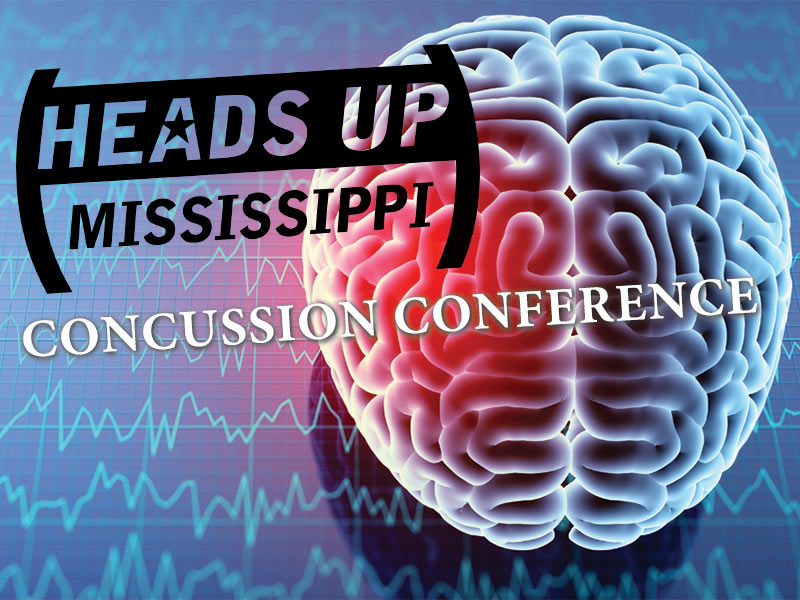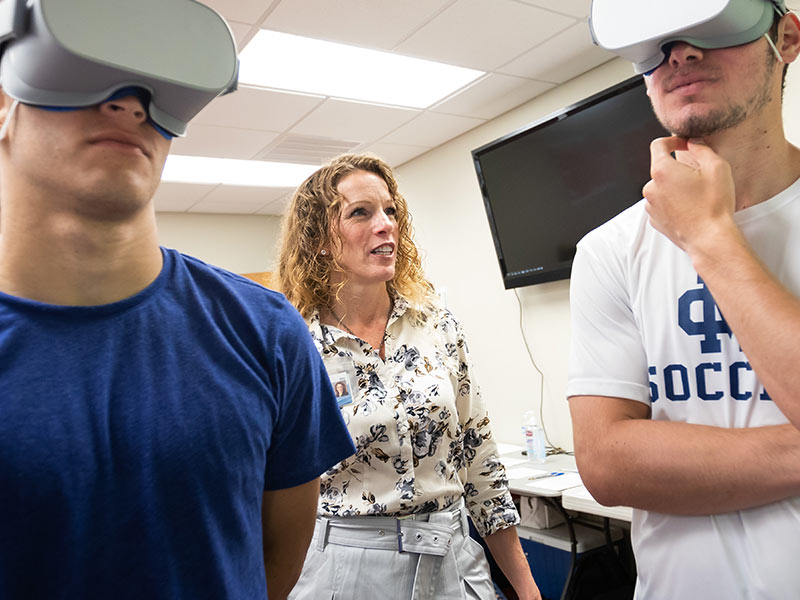Lacking concussion system, Mississippi athletes in contact sports at risk

On Fridays during football season, many of Mississippi’s high school teams have an athletic trainer on the sidelines, or a team physician, or both.
And many teams have neither.
That inequity can mean the difference between life and death for players with a suspected concussion, and not just on the football field. Athletes in all contact sports are prone to concussion, a traumatic brain injury that’s caused by a blow to the head or elsewhere on the body.
Although a concussion is regarded as a mild brain injury, most often resulting in possible headache, dizziness and confusion, “there is a great risk for players who are not removed from play immediately after a concussion,” said Dr. Jennifer Reneker, University of Mississippi Medical Center associate professor of physical therapy.
“The danger is caused by Second Impact Syndrome, a life-threatening medical emergency causing swelling of the brain and often resulting in death.”
Reneker and her research team are looking through a health equity lens to develop a first-ever statewide concussion system that addresses concussion, from before a player laces up his shoes to the days and weeks that follow a concussion injury.
“Rural areas need equalized care so that you get the same thing in Indianola as you would in Jackson,” Reneker said. “What is the medical management once a concussion is suspected? How is the decision made to return a student to play, and who makes it? And what happens after a student is initially treated for concussion?
“What we are doing in Mississippi is not equal to what’s going on in other states.”

UMMC is one of just 10 academic health centers nationally chosen for an inaugural program sponsored by the Association of American Medical Colleges. The centers have been challenged to identify a community population health concern and address it with a focus on health equity. “We are working toward a long-term impact in development of an equitable (by sex and region) statewide contact sport concussion prevention system for athletes ages 12-18 in Mississippi,” Reneker said
It’s a labor of love for Reneker, and one that won’t be easy. An improved culture of safety also is needed to potentially save lives.
“People have to know what they’re seeing. A lot of health care provider education doesn’t include concussion,” Reneker said. “Kids have to be encouraged to tell the truth about getting hurt, and they need to feel that they won’t be penalized for saying they feel bad.”
And, parents and coaches need to respect the health care professionals best trained to evaluate player injuries. “Medical providers need to feel confident and supported when they make a difficult decision about removing a kid from a high-stakes game,” she said.
“We don’t have the organization now to affect the culture that’s been there for 50 years,” she said. “We don’t have an idea at all of how many concussions are suffered in this state. We have no data at all.”
Those needs will be in the spotlight Sept. 26 at the Heads Up Mississippi Concussion Conference sponsored by UMMC and a number of external agencies and nonprofits. To be held at the Hinds Community College Clyde Muse Center in Pearl, it targets athletic trainers, coaches, athletic directors, physicians, physician assistants, psychologists, nurse practitioners, nurses, physical and occupational therapists, and speech and language pathologists. Get details and register for the conference here.
Reneker and the conference planners have assembled a group of nationally acclaimed sports injury experts to bring home the message of safety, education and a system of concussion treatment. They include Dr. Brian Hainline, the first chief medical officer of the National Collegiate Athletics Association and a professor of neurology at Indiana University and New York University schools of medicine.
Mississippi in 2014 was the last state to pass legislation addressing athlete concussion. It sets out minimum standards for students in public and private schools and advocates concussion education for athletes and parents. The bill requires athletes who show symptoms to be immediately removed from a practice or game. That athlete can't return for the rest of the day, and an appropriate health care provider must clear an athlete to resume play or practice. It requires parents to sign the school’s concussion policy.
The law, however, doesn’t require a licensed health professional or athletic trainer to be present at games. It has no vehicle for enforcement, and it says there is no liability for not adhering to the law.

Coaches have progressively gotten on board, said Lee Jenkins, executive director of the Mississippi Brain Injury Association, a conference sponsor. Even so, “there’s a lot of room for improvement” in the culture, Jenkins said. “You’re always going to have some players who will try to play through concussion or any other injury.”
A medical emergency that resulted in the August 24 death of a Byhalia High football player raised questions about required protocols for injury or illness during a game. Although concussion has not been cited as a factor in his death, there was no certified trainer or medical professional present on the sidelines.
“This has got to be a wake-up call,” Jenkins said. “We can’t penalize the kids who are living in rural areas. We need to find a way to have a medical professional on the field in all districts. The coaches love these kids. They don’t want them to get hurt.”
Just as there is widespread education for recognizing signs of stroke, the same should be true for those who witness a player showing signs of concussion after a hard hit, Reneker said. “The question is whether the signs and symptoms are actually recognized, and if appropriate action is taken. The conference will provide best evidence and practice to a wide range of people across the state to improve our concussion prevention and management.”
The goal of developing a statewide system for concussion isn’t to keep kids from being physically active in a competitive sport they love, Reneker said. It’s to keep them safe while they’re playing.
“Mississippi has a fantastic opportunity to do something here that hasn’t been done before,” she said. “I say we take what Mississippi is great at, and then use it to our advantage.”

